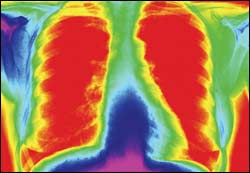Education in a clinical field can further your biomedical-equipment career

Getting a feel for the other side, so to speak, can be an eye-opening experience. One really develops an appreciation of how badly equipment can be abused when one spends 8 hours with it. Imagine using the electronic sphygmomanometer over and over to take pressures on a large number of people. Or watching your fellow health professionals disconnect the infusion pump from the wall by repeatedly pulling on the cord instead of the plug. Or seeing how often spills occur on sensitive monitors. On second thought, perhaps it’s best the biomed, at least not one that is faint at heart, not witness what happens to the equipment he or she so painstakingly repaired!
These fields aren’t for everyone. If you feel more comfortable behind the screen of an oscilloscope than in an examination room dealing with people in pain, you might not fare well in physical therapy. If you feel more comfortable calibrating pumps than bandaging a wound, you might not want to consider nursing. And if you think mucus is really “yucky,” respiratory therapy is probably not for you.
Nursing
Wouldn’t it be nice to look at a hospital’s employment Web site and see biomed job after biomed job being advertised? Well, that’s what it’s like to be a nurse today. Although the supply of nurses has cycled over the years between too many and too few, right now, and for the foreseeable future, there is an incredibly large deficit. Hospitals are scrambling to fill their nursing positions, often offering large bonuses to attract the angels of mercy to their facilities.
Nursing generally requires a 2-year associate or 4-year baccalaureate degree. The 3-year degrees are pretty much gone. Several schools offer accelerated 1-year programs for people who already have a bachelor’s degree. It’s intense, but it’s a quick way to return to the workforce. Prerequisite coursework may include classes that you have already taken, such as anatomy, physiology (or sometimes general biology), chemistry, math, English, and psychology. Often, other courses, such as nutrition, are also required.
From a biomed perspective, the nurse can be thought of as having general knowledge about many different pieces of equipment. Intensive care unit nurses, dialysis nurses, and other nurses who choose to specialize in one area often have a great deal of expertise about the specific pieces of equipment they work with every day.
Respiratory Therapy
Respiratory care practitioners generally attain associate or baccalaureate degrees. From an equipment standpoint, they are often experts at using ventilators. The field is, to an extent, driven by software and microprocessor improvements (as many biomeds who have worked on ventilators can testify to). In other words, it tends to be very equipment oriented, and the practitioners are quite comfortable with some very sophisticated items. For biomeds who want a more in-depth knowledge of ventilators, this would probably be the field for them.
Physical Therapy
The entry-level degree for physical therapists (PTs) has evolved into a master’s degree, and it is progressing into a doctorate. A doctorate of physical therapy (DPT) generally requires about 3 years of studying following the completion of a bachelor’s degree (in any subject as long as the prerequisites for PT school are met). Although some PTs get heavily involved with equipment, such as assistive technology for people who are physically challenged or electrotherapy for pain relief, many PTs emphasize their manual skills. For biomeds who want to know more about power wheelchairs, environmental-control units, prosthetics, and electrotherapy equipment, this field is a good choice.
Other Professions
The preceding descriptions were necessarily brief, and certainly not comprehensive of what these fields entail. Fortunately, numerous books exist that offer career advice. You could also try to speak with a guidance counselor at a local university. Additionally, those of you who work in a hospital can take advantage of your environment to see various professionals in action—and hopefully have a chance to discuss your careers with them.
Some degrees can be earned part-time during evenings and weekends, possibly allowing you to continue working. Nursing programs are sometimes structured that way. If night school is not an option, you may be able to restructure your work hours to allow you to attend classes during the day.
Advantages of Another Degree
By earning a degree in a hands-on patient-care field, you may be able to increase your marketability. Additionally, should the facility for which you work ever downsize or fold, also being a nurse could serve you well as a fallback job during your hunt for a new position.
Drawbacks
There are, of course, certain negative aspects to consider before pursuing an advanced or secondary degree. Chief among these are time and money. It’s a big commitment, and before you choose to trade in watching “Monday Night Football” for watching a lecture, or saving extra dollars to fund sitting in a beach chair in the Bahamas for financing sitting in a desk chair in school, make sure you take the time to weigh the pros and cons of such a decision.
It’s important, though, that you not think of obtaining a hands-on clinical degree as a move up from biomed, for biomed is an excellent profession in its own right. However, it is a way to increase your knowledge and marketability, and those are worthwhile goals for any profession.
The opinions expressed in this article are those of the author, and do not necessarily represent the official policy or position of the Department of the Army, Department of Defense, or the US Government.
Major Bob Feldman is an Army reservist presently on active duty.



